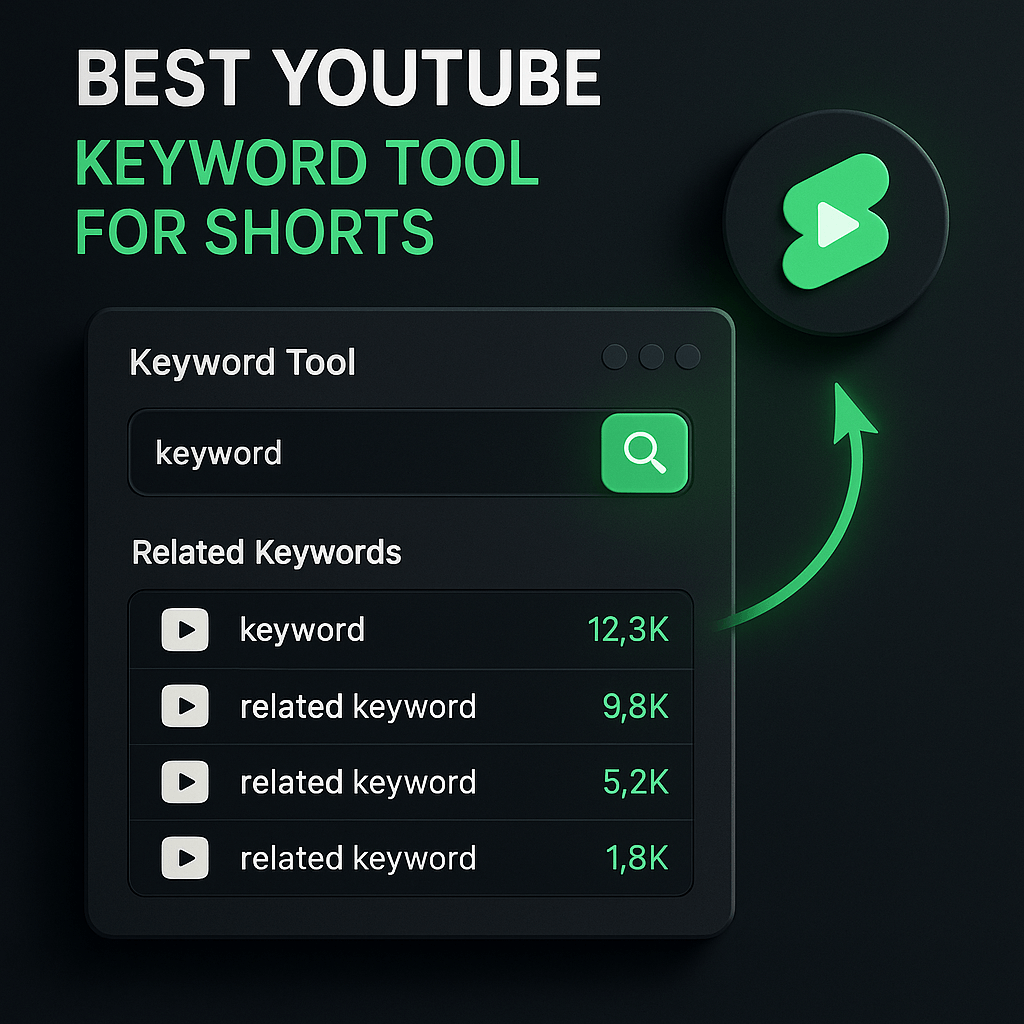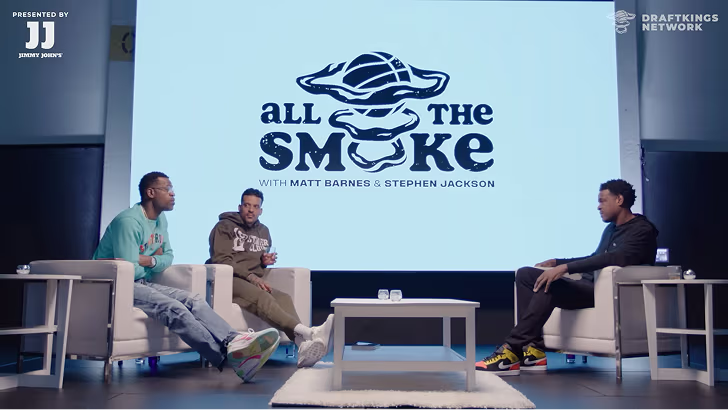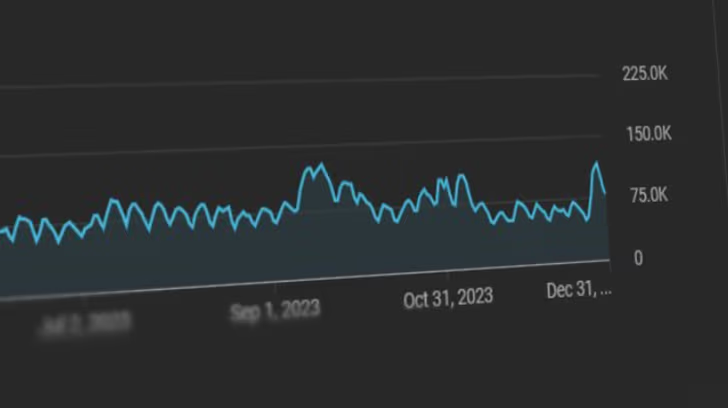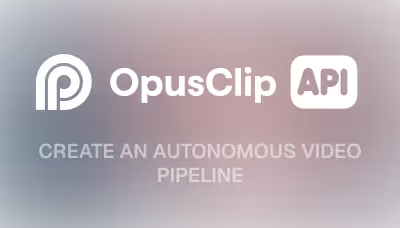10 Best YouTube Keyword Tools for Shorts Creators

Finding the right keywords can make or break your YouTube Shorts strategy. I've spent countless hours testing keyword research tools, and I can tell you that the difference between a Short that gets 500 views and one that hits 50,000 often comes down to targeting the right search terms. The YouTube Shorts algorithm prioritizes discoverability, which means your titles, descriptions, and hashtags need to align with what viewers are actively searching for.
In this guide, I'll walk you through the 10 best YouTube keyword tools specifically valuable for Shorts creators. Whether you're just starting out or looking to scale your existing channel, these tools will help you identify high-traffic keywords, understand search intent, and create content that actually gets discovered. I'll also share how OpusClip can help you repurpose your best-performing content into optimized Shorts with AI-powered captions and strategic framing that keeps viewers engaged.
Key Takeaways
- YouTube keyword tools help Shorts creators identify high-traffic search terms and trending topics before competition becomes saturated.
- Free tools like YouTube Search Suggest and Google Trends provide valuable insights without requiring paid subscriptions or complex setups.
- Paid tools like Ahrefs and VidIQ offer advanced metrics and competitor analysis for creators serious about systematic growth.
- Effective keyword research balances search volume with competition, targeting terms where your channel has a realistic chance of ranking.
- Search intent validation ensures your Shorts format matches what viewers expect when searching for specific keywords.
- OpusClip streamlines Shorts creation by automatically clipping, captioning, and optimizing longer videos into keyword-targeted Shorts.
- Consistent performance tracking and iteration based on analytics data improves keyword strategy over time and maximizes ROI.
Why Keyword Research Matters for YouTube Shorts
YouTube Shorts may seem like a format where virality happens randomly, but successful creators know better. The platform's search and discovery algorithms rely heavily on metadata signals like titles, descriptions, and tags to understand what your content is about and who should see it. When you use the right keywords, you're essentially telling YouTube exactly where your Short belongs in the ecosystem of content, which dramatically increases your chances of appearing in search results and suggested feeds.
The stakes are higher than you might think. YouTube processes over 3 billion searches per month, making it the second-largest search engine after Google. Shorts creators who ignore keyword research are essentially publishing content into a void, hoping the algorithm will magically figure out their audience. Meanwhile, creators who invest 15 minutes in keyword research before filming can target specific search queries, ride trending topics, and position their Shorts in front of viewers who are already interested in their niche.
How Keywords Impact Shorts Performance
Keywords influence multiple ranking factors that determine whether your Short gets buried or goes viral. First, they help YouTube categorize your content correctly, which affects which viewers see your Short in their feed. Second, strong keyword optimization improves your click-through rate because your titles and thumbnails match what viewers are actively searching for. Third, keywords help you tap into existing search volume rather than hoping to create demand from scratch. I've seen channels double their average views per Short simply by switching from generic titles to keyword-optimized ones that target specific search queries.
The Shorts Algorithm and Search Intent
YouTube's algorithm for Shorts prioritizes watch time, engagement, and relevance. When you use keywords that match viewer search intent, you're more likely to attract an audience that watches your entire Short, likes it, and engages with your channel. This creates a positive feedback loop where the algorithm shows your content to more people. Understanding search intent means knowing whether viewers want tutorials, entertainment, quick tips, or product reviews when they search for a particular keyword. The best keyword tools help you decode this intent so you can create Shorts that deliver exactly what viewers expect.
Top 10 YouTube Keyword Tools for Shorts Creators
I've tested dozens of keyword research tools over the past two years, and these 10 consistently deliver the most actionable insights for Shorts creators. Each tool has unique strengths, whether it's finding trending topics, analyzing competitor strategies, or uncovering long-tail keywords with low competition. I'll break down what makes each tool valuable, how to use it effectively, and which creators will benefit most from its features.
1. YouTube Search Suggest (Free)
The most underrated keyword tool is built right into YouTube's search bar. When you start typing a query, YouTube's autocomplete feature shows you real search terms that people are actively using. This is pure gold for Shorts creators because it reflects actual user behavior, not theoretical search volume. I use this method daily by typing my main topic and then adding letters A through Z to see different variations. For example, searching "how to edit videos" and then "how to edit videos a," "how to edit videos b," and so on reveals dozens of specific queries like "how to edit videos and add music" or "how to edit videos better." This technique takes five minutes and gives you a list of proven keywords that people are searching for right now.
2. TubeBuddy (Freemium)
TubeBuddy is a browser extension that integrates directly with YouTube Studio, making keyword research seamless. Its keyword explorer shows search volume, competition level, and an overall keyword score that helps you identify opportunities. What I love about TubeBuddy for Shorts is its tag suggestions feature, which recommends related keywords based on your main topic. The free version gives you basic keyword data, while the paid tiers unlock advanced features like search rank tracking and competitor analysis. For Shorts creators, the ability to see which tags your competitors are using on viral Shorts is incredibly valuable for reverse-engineering successful strategies.
3. VidIQ (Freemium)
VidIQ offers similar functionality to TubeBuddy but with a stronger focus on analytics and trending content. Its daily ideas feature is particularly useful for Shorts creators because it shows you trending topics in your niche with keyword suggestions already attached. I check VidIQ every morning to see what's gaining traction, then create Shorts around those topics before the trend peaks. The keyword inspector tool shows you search volume, competition, and related keywords, while the competitor tracking feature lets you monitor what's working for other channels in your space. VidIQ's Chrome extension also displays real-time stats on any YouTube video, helping you understand which keywords are driving views for successful Shorts.
4. Google Trends (Free)
Google Trends isn't YouTube-specific, but it's essential for identifying rising topics before they become saturated. The YouTube search filter lets you see trending queries specifically on the platform, and the geographic breakdown helps you target regional audiences. I use Google Trends to validate keyword ideas by checking whether search interest is growing, stable, or declining. For Shorts creators, timing is everything, and Google Trends helps you jump on trends early when competition is low. The related queries section also reveals keyword variations you might not have considered, expanding your content ideas beyond your initial brainstorm.
5. Ahrefs YouTube Keyword Tool (Paid)
Ahrefs brings enterprise-level SEO capabilities to YouTube keyword research with detailed metrics on search volume, keyword difficulty, and click potential. While it's pricier than other options, the data accuracy is exceptional, and the keyword ideas report generates hundreds of related terms from a single seed keyword. For Shorts creators who are serious about growth, Ahrefs helps you identify content gaps where search demand exists but competition is manageable. The parent topic feature is particularly clever, showing you broader topics that might be easier to rank for than your specific keyword. If you're already using Ahrefs for website SEO, adding YouTube keyword research to your workflow is a natural extension.
6. Keyword Tool (Freemium)
Keyword Tool specializes in generating long-tail keyword variations using YouTube's autocomplete data. It's incredibly fast, producing hundreds of keyword suggestions in seconds based on your seed term. The free version gives you the keywords without search volume data, while the paid version adds metrics and competition analysis. What makes Keyword Tool valuable for Shorts creators is its question-based keyword filter, which shows you queries starting with "how," "what," "why," and "when." These question keywords are perfect for educational Shorts because they target viewers with specific problems looking for quick solutions. I use this tool when I need to generate a large list of content ideas quickly, then validate the best ones with other tools.
7. Morningfame (Paid)
Morningfame takes a different approach by focusing on your channel's specific growth stage and audience. Instead of just showing you popular keywords, it recommends topics that match your current subscriber count and niche authority. This is brilliant for Shorts creators because it prevents you from wasting time targeting keywords that are too competitive for your channel size. The tool analyzes your existing videos to understand your content style, then suggests keywords where you have a realistic chance of ranking. Morningfame also provides a keyword competitiveness score specifically calibrated to your channel, making it easier to choose battles you can actually win.
8. Rapidtags (Free)
Rapidtags is a straightforward tool that generates relevant tags and keywords for your YouTube videos and Shorts. You enter your main topic, and it produces a list of related tags that you can copy directly into your video settings. While it doesn't provide search volume data, it's excellent for discovering semantic variations and related terms you might have missed. I use Rapidtags as a quick brainstorming tool when I need tag ideas fast, especially for Shorts where I want to maximize discoverability without spending 30 minutes on keyword research. The tool is completely free and requires no signup, making it perfect for creators who want simple, actionable keyword suggestions.
9. Keywordtool.io for YouTube (Freemium)
This platform offers dedicated YouTube keyword research with a clean interface and fast results. It pulls data from YouTube autocomplete and organizes suggestions by questions, prepositions, and hashtags, which is particularly useful for Shorts creators planning content series. The hashtag suggestions are valuable because YouTube Shorts rely heavily on hashtags for discovery, and finding the right balance between popular and niche hashtags can significantly boost your reach. The free version provides keyword ideas, while the pro version adds search volume, cost-per-click data, and competition metrics. I appreciate how the tool separates keyword types, making it easy to find exactly what I need for different content formats.
10. YouTube Analytics (Free)
Your own YouTube Analytics is one of the most overlooked keyword research tools available. The "Traffic source: YouTube search" report shows you exactly which keywords are already driving views to your Shorts, revealing opportunities you might not have considered. I check this report weekly to identify which search terms are working, then create more Shorts targeting similar keywords. The "Reach" tab also shows you which videos are being suggested alongside yours, helping you understand your competitive landscape. For Shorts creators, the "Audience" section reveals what other content your viewers watch, which can inspire new keyword targets and content angles that align with your audience's interests.
How to Use Keyword Tools Effectively for Shorts
Having access to great keyword tools means nothing if you don't have a systematic approach to using them. I've developed a workflow that takes about 20 minutes per content batch and consistently helps me identify high-potential keywords for Shorts. The key is balancing search volume with competition, understanding search intent, and validating your keyword choices before you invest time in content creation.
Step 1: Start with Seed Keywords
Begin by brainstorming 5 to 10 broad topics related to your niche. These are your seed keywords, the foundation for deeper research. For example, if you create fitness Shorts, your seed keywords might include "home workouts," "weight loss tips," "muscle building," and "healthy recipes." Enter these into your chosen keyword tool to generate hundreds of related terms and variations. Don't filter too aggressively at this stage; you want a comprehensive list to work with.
Step 2: Analyze Search Volume and Competition
Review your keyword list and look for the sweet spot where search volume is decent but competition isn't overwhelming. For most Shorts creators, keywords with 1,000 to 10,000 monthly searches are ideal because they have enough demand to drive meaningful views but aren't dominated by established channels. Pay attention to keyword difficulty scores, and prioritize terms where you have a realistic chance of ranking in the top results. I typically create a spreadsheet with my top 20 to 30 keywords, including their metrics, so I can compare options side by side.
Step 3: Validate Search Intent
Before committing to a keyword, search for it on YouTube and watch the top-performing videos. This tells you what viewers actually want when they search for that term. Are they looking for tutorials, entertainment, product reviews, or quick tips? If the top results are all 10-minute tutorials but you're planning a 60-second Short, that keyword might not be the right fit. Match your content format to the dominant search intent, or find a different angle that serves the same audience need in a Shorts-friendly way.
Step 4: Create a Content Calendar
Organize your validated keywords into a content calendar that balances trending topics with evergreen content. I aim for 70% evergreen keywords that will drive consistent search traffic over time and 30% trending keywords that capitalize on current interest. This approach ensures steady growth while giving you opportunities for viral moments. Schedule your Shorts creation around keyword clusters, filming multiple videos on related topics in one session to maximize efficiency.
Step 5: Optimize Your Shorts Metadata
Use your primary keyword in your Short's title, preferably near the beginning. Include 2 to 3 related keywords naturally in your description, and add 5 to 8 relevant hashtags that mix popular and niche terms. Don't keyword-stuff; your metadata should read naturally while signaling to YouTube what your content is about. I also add my primary keyword to the video filename before uploading, as some creators believe this provides an additional relevance signal to the algorithm.
Step 6: Track Performance and Iterate
After publishing, monitor your Shorts' performance in YouTube Analytics, paying special attention to traffic sources and search terms. If a Short performs well from search traffic, create more content targeting related keywords. If it underperforms, analyze whether the issue was keyword selection, content quality, or metadata optimization. I review my analytics every two weeks and adjust my keyword strategy based on what's actually driving views and engagement, not just what the tools predicted.
Maximizing Shorts Discoverability with OpusClip
Keyword research is only half the battle; you also need to create Shorts that keep viewers watching and engaging. This is where OpusClip becomes invaluable for creators who want to repurpose longer content into optimized Shorts. OpusClip's AI analyzes your videos and automatically identifies the most engaging segments, then clips them into Shorts with dynamic captions, strategic reframing, and brand-consistent styling. This means you can take a 20-minute tutorial and instantly generate 5 to 7 keyword-optimized Shorts, each targeting different search queries.
What I love about using OpusClip in my keyword workflow is that it handles the technical optimization while I focus on strategy. The AI-generated captions improve accessibility and watch time, which are critical ranking factors for Shorts. The auto-reframing ensures faces and key visual elements stay centered even when converting horizontal videos to vertical format, maintaining professional quality without manual editing. You can also apply custom brand kits to ensure every Short matches your channel's visual identity, building recognition across your content library. When you combine strategic keyword research with OpusClip's efficient content creation, you can publish more Shorts, test more keywords, and scale your channel faster than manual editing would ever allow.
Frequently Asked Questions
How many keywords should I target in a single YouTube Short?
Focus on one primary keyword for your title and 2 to 3 related secondary keywords in your description. Trying to target too many keywords dilutes your relevance signals and confuses the algorithm about your content's main topic. Your primary keyword should appear naturally in the first 5 words of your title for maximum impact. Use hashtags to cover additional related terms, but keep your core metadata focused on a single search intent.
Do YouTube Shorts need different keywords than regular videos?
Shorts often perform better with action-oriented, quick-tip keywords rather than comprehensive tutorial terms. Viewers searching for Shorts typically want fast answers, entertainment, or inspiration rather than in-depth education. Look for keywords with modifiers like "quick," "easy," "simple," or "in 60 seconds" that signal short-form content. That said, you can still target the same core topics as longer videos, just with a different angle that matches the Shorts format and viewer expectations.
How often should I research new keywords for my Shorts?
I recommend doing comprehensive keyword research weekly to identify trending topics and quarterly to refresh your evergreen content strategy. Daily monitoring of trending topics through tools like VidIQ or Google Trends helps you capitalize on viral moments quickly. Between research sessions, track which keywords are actually driving traffic to your existing Shorts and double down on what's working. The YouTube landscape changes rapidly, so regular research ensures you're not missing opportunities or wasting effort on declining search terms.
Can I use the same keywords as my competitors?
Yes, but you need to differentiate your content angle or target a more specific variation of the keyword. If a competitor ranks well for "morning workout routine," you might target "morning workout routine for beginners" or "5-minute morning workout routine" to reduce direct competition. Analyze what's missing from top-ranking Shorts and create content that fills those gaps. Sometimes the best strategy is targeting the same keywords but delivering higher quality, better optimization, or a unique perspective that makes your Short stand out.
What's the biggest keyword research mistake Shorts creators make?
The most common mistake is targeting keywords that are too competitive for their channel size and authority. New creators often go after high-volume terms dominated by established channels, then get discouraged when their Shorts don't rank. Start with long-tail keywords that have lower search volume but also lower competition, build your channel's authority, then gradually target more competitive terms. Another major mistake is ignoring search intent and creating content that doesn't match what viewers actually want when they search for a particular keyword.
How do I know if my keyword optimization is working?
Check your YouTube Analytics "Traffic source: YouTube search" report to see what percentage of your views come from search and which keywords are driving that traffic. If search traffic is growing as a percentage of total views, your optimization is working. Also monitor your Shorts' performance in the first 48 hours after publishing; well-optimized Shorts typically see steady view growth from search rather than just an initial spike from subscribers. Compare your click-through rate and average view duration across different keyword strategies to identify which approaches resonate best with your target audience.
Should I update keywords on older Shorts that aren't performing well?
Absolutely, refreshing metadata on underperforming Shorts can give them new life in search results. Update titles to include stronger keywords, rewrite descriptions with better optimization, and add relevant hashtags you might have missed initially. However, be strategic about which Shorts you update; focus on content that's still relevant and has decent watch time but just needs better discoverability. I typically audit my Shorts library monthly and update 5 to 10 older videos with improved keywords based on what I've learned from recent analytics data.
Conclusion
Mastering YouTube keyword research transforms Shorts creation from guesswork into a strategic growth system. The 10 tools I've shared give you everything you need to identify high-potential keywords, understand your audience's search behavior, and create Shorts that actually get discovered. Whether you start with free tools like YouTube Search Suggest and Google Trends or invest in premium platforms like Ahrefs and VidIQ, the key is developing a consistent research workflow that informs every piece of content you create.
Remember that keyword research is an ongoing process, not a one-time task. The YouTube algorithm evolves, trends shift, and your audience's interests change over time. Stay curious, track your results, and continuously refine your approach based on what the data tells you. When you combine strategic keyword targeting with efficient content creation tools like OpusClip, you can scale your Shorts production while maintaining quality and relevance. Start with one or two of these keyword tools today, test them on your next batch of Shorts, and watch how targeted optimization transforms your channel's discoverability and growth trajectory.

























